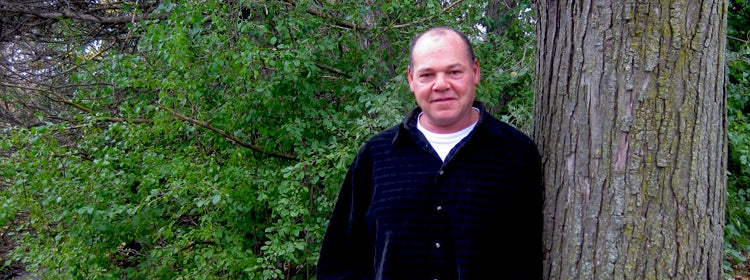Jonathan Witt: Communicating with Care
 |
| Jonathan Witt, taking a break from teaching to enjoy one of Waterloo's green spaces. |
Written by Sophie Twardus, Special Projects (Teaching Stories), CTE.
Step into Dr. Jonathan Witt’s classroom and you can’t help but be enthralled by his sonorous voice. Every word he says is clearly enunciated, every sentence is uttered without hesitation, and every idea is carefully, clearly, and patiently explained. During his lecture, there is no chatter of students whispering to one other, and even at the back of the classroom everyone is fully engaged. As his graduate student Jessica Leung says, “John has a gift when it comes to teaching: he’s very eloquent. He can explain a topic to you in many different ways. He also has an awesome speaking voice – it’s very soothing and it takes control of a class somehow.” His undergraduate students echo this assessment. “He’s a great lecturer who never fails to keep class interesting,” says one. Another adds, “He reels you in during the first lecture and after that you won't want to miss a class.” A third raves, “He’ll answer all questions until you understand it. Go to class because he explains things really well!” Most students, it seems, heed this advice: in his fourth-year courses, attendance for any given class hovers around 95% to 98%. With such an enthusiastic following, it’s no surprise that in 2011 Witt received an Excellence in Science Teaching Award.
Witt is not only an expert communicator but is also committed to helping his students acquire and hone that same skill. Jessica Leung says that “From him I’ve learned how to write much better and how to communicate more effectively with people who are not in the field.” This is important, Leung adds, because “many students don’t know how to communicate in a professional setting.” Witt’s emphasis on clear and effective communication permeates all aspects of his teaching. Concerned that his students lack the general vocabulary that they need to communicate effectively, he begins each class with a “words of the day” segment in which he introduces and defines two new words – “opprobrium,” for example, or “nefarious.” By learning all the words, Witt’s students have the opportunity to earn up to four bonus marks at the end of the term. Witt’s rationale for this learning activity is that students need a wide vocabulary to communicate effectively. “Science students,” he says, “tend to have a very recondite vocabulary. Compared to their peers in the humanities, the breadth of their vocabulary can be lacking.”
Witt also strives to create multiple alternative opportunities where he and his students can communicate and interact. This term he has organized a “Study with the Prof Night” before each midterm: he books a room and informs students that he will be present to answer questions. He’ll even offer them tips on how to study effectively. Additionally, if six or more students meet as a group for additional study sessions, Witt will – at their request – make time to attend in order to provide further guidance. Why? Because it’s important, Witt says, given the large size of his classes, “to create more personal learning environments where students don’t feel intimidated.” Students remark frequently on how readily Witt makes himself accessible to them. Graduate student Patrick Pathammavong comments that “He’s very available all the time. He has so many office hours!” Another student remarks on how promptly Witt responds to emails.
Witt clearly takes a many-pronged approach to teaching, but what drives him, as Jessica Leung observes, is really quite simple: “He really cares about students learning.”
Read more Teaching Stories
Tip sheets
CTE has developed more than 100 Teaching Tips. Each one is a succinct document that conveys useful ideas and practical methods for effective teaching. Some of the Teaching Tips that are relevant to the strategies mentioned in this Teaching Story include the following: